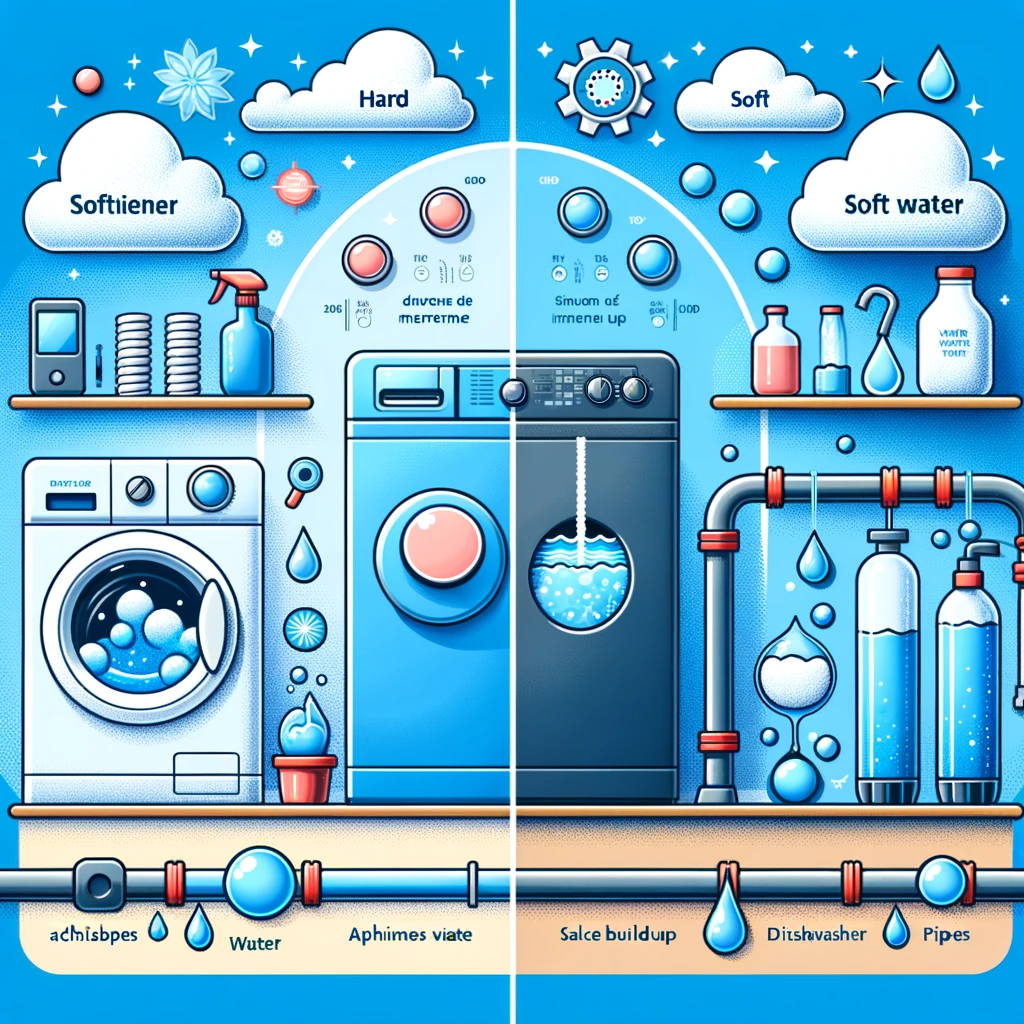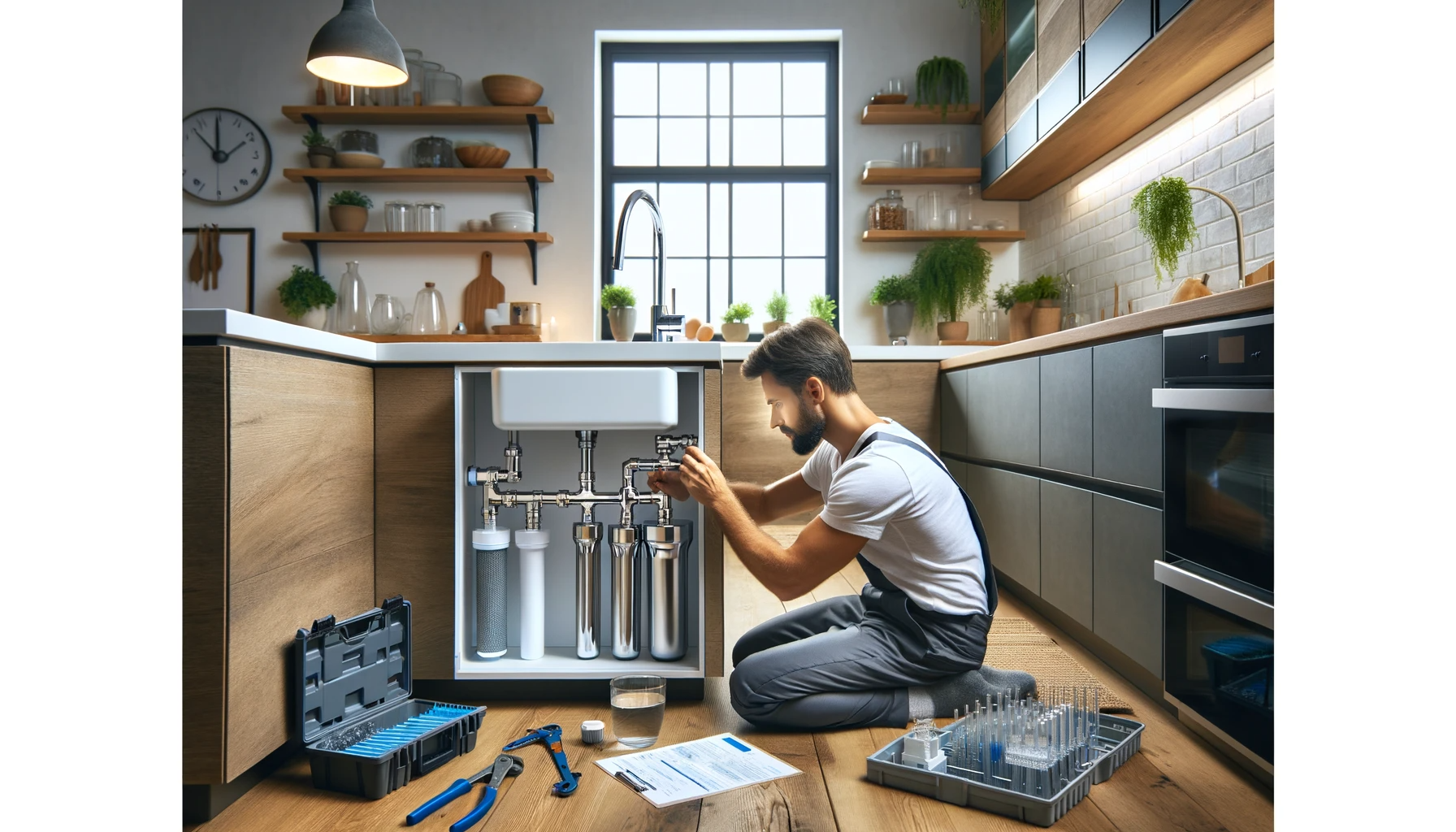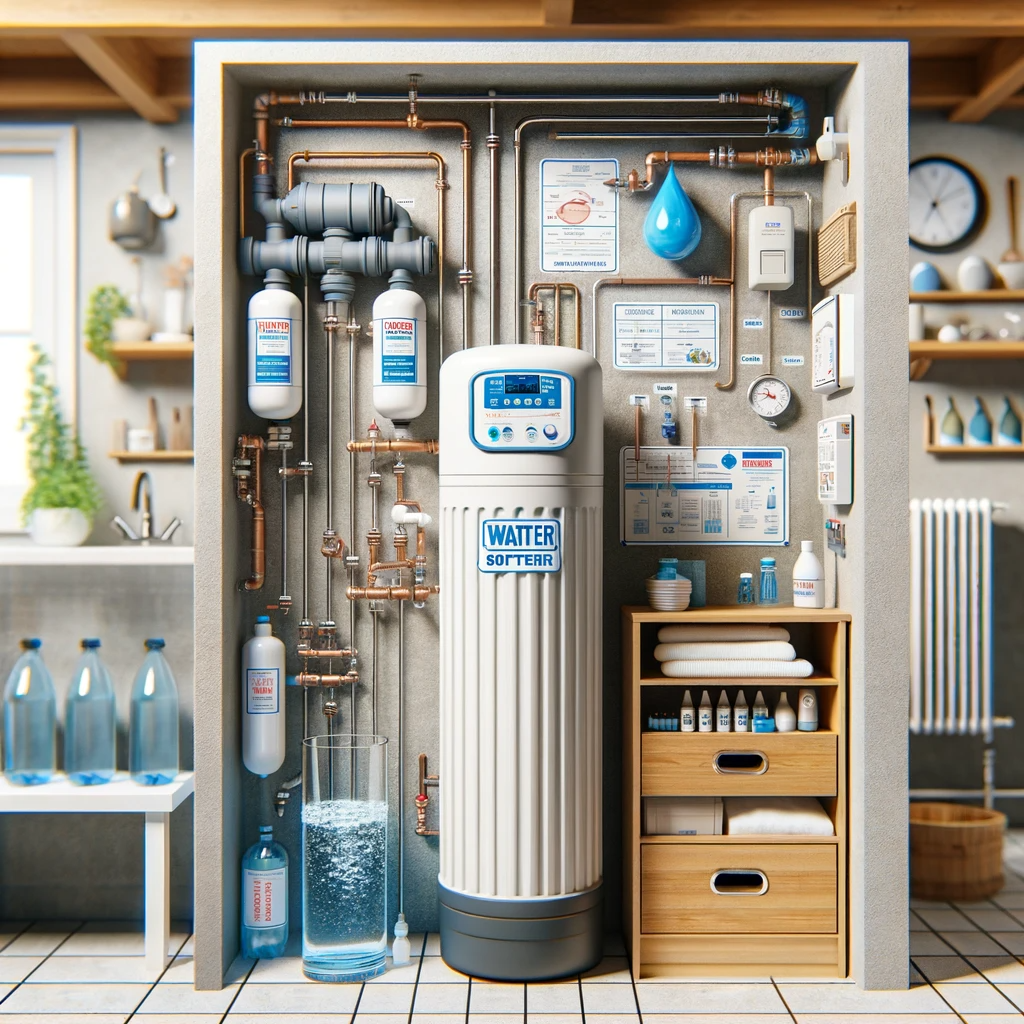A water softener system reduces mineral buildup and extends appliance longevity. It enhances soap efficiency, providing softer skin and cleaner laundry.
Ensuring your home’s water quality is optimal can profoundly impact daily life. A water softener system plays a crucial role by removing calcium and magnesium minerals that cause hardness. This process not only prevents the scaling that can damage plumbing, but it also improves the performance and lifespan of home appliances that use water, like dishwashers and water heaters.
The benefits extend to personal care, with soaps and shampoos lathering more effectively, resulting in softer skin and hair. Additionally, with softened water, clothing washes come out cleaner and free from the hard water stains that can bedevil fabrics. Investing in a water softener system is an investment in both home and health, offering a multitude of advantages from the subtle comforts of everyday living to the long-term savings on household maintenance.
Understanding Water Softeners
Water softener systems transform hard water into soft, eliminating minerals that cause scale buildup and soap scum. Softened water enhances appliance efficiency, prolongs its lifespan, and can lead to smoother skin and cleaner laundry.
Many homeowners face the challenge of hard water which can wreak havoc on pipes, appliances, and even skin and hair health. Water softeners offer a reliable solution to this common problem, employing a process to replace the minerals that cause water hardness.
How Do Water Softeners Work?
Water softeners are intriguing devices that uniquely tackle the issue of hard water. Typically installed where the water supply enters the home, they perform through ion exchange:
- Ion exchange process: Swapping minerals like calcium and magnesium with sodium or potassium ions to mitigate water hardness.
- Resin beads within the system: Acting as a magnet for the hard minerals, the resin beads bind with them and allow the exchange for softer minerals.
Key Benefits Of A Water Softener System
Water softener systems offer a myriad of benefits, including prolonged appliance life and reduced scale buildup. Enjoy softer skin and hair, alongside significant savings on soap and detergent usage. These advantages ensure a water softener is a smart addition to any home.
Water softener systems are becoming an increasingly popular solution for homeowners grappling with the ill effects of hard water. These innovative systems offer a plethora of advantages that extend beyond the mere improvement of water quality. Let’s delve into the key benefits that installing a water softener can bring to your home and daily life.
Extended Appliance Lifespan
One of the most compelling reasons to install a water softener is the extension of the lifespan of household appliances. Hard water, laden with minerals like calcium and magnesium, can accumulate in appliances, leading to inefficiencies and breakdowns. Having a water softener, your appliances avoid damaging scales, ensuring they run smoothly for longer periods.
Softer Skin And Hair
- Prevention of dryness: Soft water lacks the mineral ions that cause dry skin and hair, which often leads to a more supple feel after bathing.
- Enhanced product efficiency: With soft water, soap and shampoo lather more effectively, requiring less product usage and resulting in potential cost savings.

Reduced Cleaning Time And Expenses
Imagine a home where limescale buildup is no longer an adversary, and soap scum is a thing of the past. A water softener system significantly mitigates these issues, cutting down on the time, effort, and products needed for cleaning. This not only eases your household chores but can also reflect savings in your budget over time.
Improved Water Heater Performance
Lower Utility Bills
The efficiency of water heaters can leap drastically when they operate with soft water. Due to the absence of mineral scale formation, water heaters can heat more effectively, which translates to faster availability of hot water and reduced energy costs, making a water softener system a smart economic choice.
Enhanced Environmental Impact
- Reduction in detergent usage: Soft water enhances the efficacy of detergents, allowing for a decrease in the quantity required for washing, thus lowering the chemical load on the environment.
- Decreased energy consumption: Appliances operating more efficiently result in less energy used, and when combined with reduced soap and detergent use, your carbon footprint shrinks dramatically.
Taking the leap and installing a water softener in your home can result in a breadth of benefits. From enjoying the little luxuries of softer skin and hair to making a positive impact on the environment and your finances, the advantages are clear.
A water softener system is not just an upgrade to your home’s plumbing, it’s an investment in an improved way of living.
Economic Advantages
Investing in a water softener system offers significant economic advantages, such as reducing household expenses on soap and detergents. It also prolongs the lifespan of appliances by preventing limescale buildup, leading to fewer repairs and replacements.
Water softeners have become a household essential in areas plagued by hard water. It’s not just about the feel of your clothes or the taste of your water; the economics of using a water softener system pervades several aspects of daily living.
Let’s dive into the cost-saving benefits you can expect when you invest in a water softener system.
Extended Appliance Lifespan
Appliances are the workhorses of the modern home, but hard water can lead to their untimely demise. A water softener system can play a vital role in extending the life expectancy of appliances that utilize water, such as dishwashers, washing machines, and water heaters.
By preventing mineral buildup and corrosion, soft water can significantly reduce the wear and tear on these appliances, resulting in fewer repair costs and less frequent replacements.
Reduction In Soap And Detergent Usage
Hard water hinders the effectiveness of soap and detergents, demanding more products to achieve the desired cleaning power. Here are the ways soft water aids in economic savings:
- Enhanced cleaning efficacy: Soft water allows soap to lather easily, meaning you can use less detergent for laundry and dishwashing without compromising on cleanliness.
- Decreased water heating costs: Soft water heats more efficiently than hard water, reducing the energy needed and lowering utility bills.
By making the transition to soft water, you’ll find yourself buying cleaning products less often, which can translate into considerable savings over time.
Streamlined Energy Consumption
Water softeners’ positive impact on home energy usage is an often overlooked benefit. The efficiency of water heaters can be severely hampered by the presence of minerals typical in hard water, forcing them to work harder and consume more energy.
- Prevention of scale: Soft water prevents the formation of scale deposits in pipes and heaters, ensuring that your systems operate with optimal efficiency.
- Consistent water temperature: With a water softener, water heaters maintain a steady temperature without exerting extra energy, leading to lower electricity or gas costs.
The cumulative effect of these savings contributes to a reduction in your home’s overall energy footprint, alongside welcome financial relief.

Improved Plumbing System Health
Your plumbing system’s health is integral to the longevity and maintenance of your home. Soft water helps maintain the integrity of your plumbing, avoiding the problems associated with mineral deposit buildup.
- Unclogged pipes: Soft water minimizes the risk of clogged pipes, which can result in expensive plumbing repairs or the need for complete pipe replacements.
- Maintained water pressure: By preventing scale, soft water ensures consistent water pressure, avoiding the strain on pipes and fixtures that reduces their lifespan.
This proactive maintenance means fewer emergency calls to the plumber and, over time, a more robust and reliable plumbing system.
By dissecting these economic benefits, it becomes clear that a water softener system is more than a mere luxury; it’s a smart financial choice for savvy homeowners. Not only can it enhance daily life by improving the quality of water, but the long-term savings in utility bills, appliance repairs, and everyday household expenses make it a wise investment with tangible paybacks.
Health And Environmental Impact
A water softener system not only prolongs appliance longevity but also lessens the scale buildup in pipes. The reduction in harsh chemicals benefits both skin health and the environment, as less contaminated wastewater returns to the ecosystem.
Navigating the myriad of home appliances can often be a daunting task. However, the integration of a water softener system presents notable advantages that extend beyond just preventing limescale buildup. Let’s delve into how such a system can impact health and the environment positively.
Health Benefits Of Water Softeners
Water softeners work by removing minerals like calcium and magnesium that make water “hard”. This process not only benefits household appliances but can also have direct effects on your well-being:
- Skin and Hair Health: Hard water can leave skin feeling dry and hair dull because it hampers the effectiveness of soap and shampoo. By softening your water, soaps lather better, your skin retains more moisture, and your hair can reclaim its natural shine and strength.
- Digestive System Advantage: Cutting out hard minerals from your drinking water can contribute to a more balanced digestive process. The absence of excess minerals may help alleviate some stomach issues linked to the consumption of hard water.
Balancing the perks of softened water means also considering how it can harmoniously coexist with the environment around us.
Environmental Impact Of A Water Softener System
Implementing a water softener system in your home is more than personal convenience. It bears a significant relationship with the larger ecological picture:
Softened water can lead to lower consumption of detergents and soaps. Since soft water enhances the effectiveness of these cleaning agents, you can use less of them, which reduces the amount of chemicals entering the water system and, consequently, the environment.
Requiring fewer soap and detergent can also diminish packaging waste and lower manufacturing demand, benefiting the environment further.
- Energy Efficiency: Appliances running with soft water operate more efficiently. Mineral buildup in appliances like water heaters can hamper their performance and increase energy consumption. By using a water softener, you’re not only extending the life of these appliances but also promoting more energy-efficient operations, which leads to lower carbon emissions and a smaller environmental footprint.
- Water Conservation: Water softeners can aid in reducing water usage. High-efficiency models especially are designed to minimize the amount of water needed for the softening process, thereby conserving this precious resource with every cycle.
Embracing a water softener system can, therefore, be a stride towards enhancing your quality of life while also considering the well-being of our planet. By being mindful of the products we use and how they affect the environment, we can make choices that support a healthier lifestyle and a more sustainable world.
Installation And Maintenance
Ensuring your water softener system receives regular installation and maintenance can lead to significant benefits. Proper upkeep helps to extend the appliance’s life and optimizes performance, promising soft water for your household needs.
Why You Should Consider Installing A Water Softener System
Opting for a water softener system in your home is a smart move for anyone tired of dealing with the woes of hard water. These systems are more than just an investment—they’re a path to softer skin, shinier hair, and a longer lifespan for your appliances.
Now, let’s dive into the nitty-gritty of setting them up and keeping them running smoothly.
Installation Ease: Simpler Than You Might Think
The thought of installing a water softener system might sound daunting, but it’s straightforward with the right guidance:
- Professional installation: Many companies offer full-service installation, ensuring your system is hooked up correctly and efficiently without any heavy lifting on your part.
- DIY-friendly options: Some water softeners are designed for savvy homeowners who prefer a hands-on approach, complete with step-by-step instructions.
Regular Maintenance: Keeping Your System In Top Shape
Continual performance from your water softener doesn’t just happen. It hinges on regular upkeep:
- Salt replenishment: Regularly adding salt to your brine tank is crucial for the ion exchange process that softens your water.
- Cleaning and servicing: An annual inspection and cleaning by a professional can help spot any potential issues before they turn into costly repairs.
By adhering to these guidelines for installation and ongoing maintenance, you set the stage for a water softener system that delivers all its promised benefits without any unwelcome surprises. With diligent care, your system can provide you with soft water for years to come, making the slight effort profoundly worthwhile.
Case Studies And Testimonials
Case studies reveal significant improvements in-home water quality following the installation of water softener systems. Testimonials underscore enhanced appliance efficiency and a noticeable difference in skin and hair health, highlighting the multifaceted advantages of softening water.
Real-life Impact On Homeowners
When people share their experiences with water softener systems, it’s easy to see how transformative the equipment can be. Homeowners often report a range of improvements that affect various aspects of their domestic life.
Decreased Energy Bills: A Case Study Example
- Energy Efficiency Improvement:
A family in Texas witnessed a significant drop in their energy bills after installing a water softener. Their water heater functioned more efficiently, as the absence of mineral buildup led to better heat transfer and less energy consumption.
- Prolonged Appliance Lifespan:
The same family also noted that their household appliances such as the dishwasher and washing machine lasted longer without the frequent repairs that were necessary before the system’s installation.
Skin And Hair Health Improvement: Customer Feedback
Glowing reviews often mention enhanced skin and hair health with the use of softened water. It turns out that the absence of hard water minerals can indeed leave skin feeling smoother and hair more lustrous.
Enhanced Cleaning Efficiency: Testimonials From Busy Parents
- Less Detergent Used:
A testimonial from a parent in the Midwest highlighted that they use significantly less detergent for laundry and dishwashing, thanks to their water softener’s ability to work well with less soap.
- Spotless Surfaces Without the Hard Scrubbing:
The same parent was thrilled to find that water spots and soap scum on fixtures and tiles were virtually eliminated, slashing their cleaning time in half.
Lifelong Savings: Investment Analysis
Investing in a water softener system can lead to considerable savings over time. Analysts have put the numbers to the test and found that the reduction in repair costs, coupled with decreased energy and detergent use, essentially allows the system to pay for itself.
The Joy Of Pure Water: A Family’s Story
One family’s account of their experience brings a personal touch to the statistics. They’ve shared how the taste of their drinking water improved markedly and how they enjoy peace of mind knowing that their water is purer for their children.
Through these case studies and testimonials, it’s clear that water softener systems offer more than just soft water—they offer a heightened quality of life. Whether it’s the joy of a better-tasting morning coffee or the relief of lower utility bills, these systems are changing lives one drop at a time.

Choosing The Right Water Softener System
Selecting an optimal water softener system enriches your home with numerous advantages. It ensures a deposit-free shower, longer-lasting appliances, and silkier hair and skin—an investment that elevates daily living standards and bolsters household efficiency.
Water quality plays a pivotal role in our day-to-day well-being, and a water softener system can be a game-changer for households battling hard water issues. Choosing the right system, however, isn’t as straightforward as picking the first option.
Specific considerations must guide your selection to ensure you make the most of this investment.
Understanding Water Hardness Levels
Before plunging into the range of water softeners available, grasp the significance of your home’s water hardness level. For selecting the correct size and type of softener, this is measured in grains per gallon (GPG) or milligrams per liter (mg/L).
- Water testing kits: These can determine the hardness of your water, enabling you to choose a system that’s perfectly tailored to your needs.
- Professional water analysis: Sometimes it’s best to have a professional assess your water, bringing precision to your selection process.
Evaluating Different Types Of Softeners
The market dazzles with a variety of water softener systems, each with its unique features and mechanisms. Ion exchange units are not the sole players; consider novel technologies as potential companions in combating water hardness.
- Salt-based systems: Renowned for their effectiveness, they exchange calcium and magnesium ions with sodium or potassium ions.
- Salt-free alternatives: These systems crystallize calcium particles, preventing them from forming scale without adding sodium to the water.
Capacity And Regeneration Style
Your household’s water consumption patterns must dictate the capacity of the system you choose. The regeneration method, whether timer-based, meter-based, or manual, also holds substantial weight in this decision.
- Size accordingly: Match the system’s capacity to your family’s water usage to avoid unnecessary regenerations or capacity shortages.
- Regeneration settings: Opting for a meter-based system could be cost-effective, as it regenerates only when necessary based on actual water usage.
Additional Features And Benefits
Water softener systems are not created equal, and the added features can greatly enhance convenience and efficiency. Analyze the options – from smartphone compatibility to high-efficiency models – that could revolutionize your user experience.
- User-friendly controls: Look for systems that are easy to program and adjust, saving you time and hassle.
- Energy efficiency: Some models are designed to save water and electricity, aligning with eco-friendly household goals.
Maintenance And Support
Long-term success with a water softener system pivots on reliable customer support and straightforward maintenance demands. Your selection should emphasize ease of upkeep and accessible assistance.
- Warranty and service agreements: These can shield you from unexpected repair costs and offer peace of mind with your purchase.
- Easy-to-find replacement parts: This ensures that you can quickly address any repairs or maintenance issues without a prolonged disruption of service.
Frequently Asked Questions For Benefits Of A Water Softener System
What Are The Disadvantages Of A Water Softener?
Water softeners can increase sodium levels in water, may require frequent maintenance, and involve ongoing salt purchases. They can also be costly to install and potentially discharge excess salt into the environment, affecting local ecosystems.
Is It OK to Drink Softened Water?
Drinking softened water is generally safe but may contain higher sodium levels. Consult with a healthcare provider if you have health concerns or a restricted sodium diet.
Is Water Softeners Worth The Money?
Water softeners are generally worth the investment for homeowners dealing with hard water. They can prolong the lifespan of appliances, reduce plumbing issues, and improve skin and hair health.
Why Would A House Need A Water Softener?
A house may need a water softener to remove minerals like calcium and magnesium, which cause hard water. This process helps prevent scale buildup in pipes and appliances, enhancing their efficiency and lifespan.
What Does A Water Softener System Do?
A water softener system removes minerals like calcium and magnesium from hard water, transforming it into soft water, which is gentler on household plumbing and appliances.
Conclusion
Embracing a water softener system offers a cascade of advantages for any household. It enhances appliance longevity, boosts cleaning efficiency, and can contribute to healthier skin and hair. Wise investments in home maintenance translate to enduring benefits, highlighting a water softener system as an essential choice for superior domestic water quality.
Choose to transform your water, and in turn, enrich your quality of life.


Leave a Reply